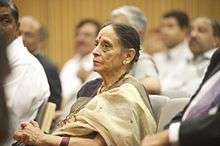Leila Seth
| Honorable Justice Leila Seth | |
|---|---|
 Justice Leila Seth | |
| 1st Chief Justice | |
|
In office 1991–1996 | |
| Personal details | |
| Born |
20 October 1930 Lucknow, India |
| Nationality | Indian |
| Spouse(s) | Prem |
| Children |
Vikram Shantum Aradhana |
| Alma mater | Studied in London |
| Religion | Hinduism |
Justice Leila Seth was the first woman judge on the Delhi High Court and she became the first woman to become Chief Justice of a state High Court on 5th August 1991.[1]
Background
Leila Seth was born in October 1930 in Lucknow and was the first woman to top the London Bar exam in 1958. She joined the bar in 1959. In the same year she also graduated as an IAS officer. Upon topping the Bar in England, Seth was referred to as “Mother-in-Law” by a London newspaper, which carried a photograph of a young and attractive Leila Seth with her infant son, born only a few months before the exams. At the same time, other newspapers expressed their grief about how out of 580 students who took the Bar Exam, a married woman topped it. [2]
When in India, she was a junior to Ashoke Kumar Sen when she used to practice during his absence from the central cabinet of India. She handled a large number of Tax matters (Income Tax, Sales Tax, Excise and Customs), Civil, Company and Criminal cases as also Matrimonial suits and writ petitions. In 1978, she was appointed as the first woman judge on the Delhi High Court. In 1991, she was appointed the Chief Justice of Himachal Pradesh.
Commissions
Justice Seth was also a part of various enquiry commissions, one of which was responsible for studying the effects of the television serial, Shaktiman (about a popular superhero) on children. Shaktiman was a popular TV series for children and it was the center of controversy because many children set themselves on fire or threw themselves off buildings hoping that Shaktiman would come and rescue them.[3] Justice Seth was also part of an enquiry into the death of businessman Rajan Pillai, known as the “Biscuit Baron”, who was found dead in police custody. She was also part of the Law Commission of India till 2000, and was responsible for the amendments to the Hindu Succession Act which gave equal rights to daughters in joint family property.
Books
Leila Seth's autobiography was published by Penguin India in 2003. In On Balance, she talks about her early years of homelessness and struggle, her straying into law while in England with her husband Prem, and later practising in Patna, Calcutta and Delhi; and her happy marriage of over fifty years, including the experience of bringing up three remarkable children: writer Vikram Seth, peace activist Shantum and film-maker Aradhana. Also dwelt upon are her views regarding corruption, discrimination and delay in the legal system; some judgments dealing with education and with inter-personal and constitutional law; and her experiences as a member of the 15th Law Commission. There are also delightful vignettes: Premo and her turning an old mansion into a splendid home in Patna, Vikram's writing of the novel A Suitable Boy, Shantum's ordination as a Buddhist teacher by Thich Nhat Hanh and Aradhana's marriage to Peter, an Austrian diplomat, and work as a documentary film director and production designer on films like Earth and Water.
In 2010, she wrote We, The Children of India, which explains the words of the Indian preamble to younger readers.
This was followed by Talking of Justice: People's Rights in Modern India, in 2014, in which she discusses several critical issues she has dealt with in her expansive legal career.
References
- ↑ http://www.mapsofindia.com/on-this-day/5th-august-1991-justice-leila-seth-becomes-the-first-indian-woman-chief-justice-of-a-state-high-court. Missing or empty
|title=(help) - ↑ http://www.mapsofindia.com/on-this-day/5th-august-1991-justice-leila-seth-becomes-the-first-indian-woman-chief-justice-of-a-state-high-court. Missing or empty
|title=(help) - ↑ "Rajan Pillai death: Advani rejects probe plea". Rediff.com. Archived from the original on 27 February 2012. Retrieved 27 February 2012.
- Seth, Leila. On Balance. New Delhi: Viking, 2003. ISBN 0-670-04988-3
- Seth, Vikram. Two Lives. HarperCollins, 2005. ISBN 0-06-059966-9